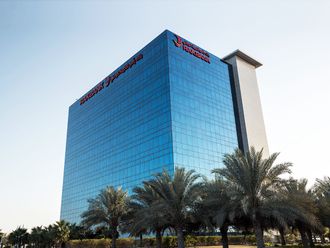Disruptive financial technologies represent the foundations of tomorrow on the platform of today. All we need to do is identify the best ways of leveraging these technologies to support the UAE’s economy as it embraces diversity, robust growth and sustainability.
The purpose of the financial sector is to stimulate the production of real wealth. Rather than considering money as a form of wealth, Islamic economy views it as a means of developing necessary assets — such as roads, schools, universities, hospitals and houses — as well as services that satisfy people’s material and moral needs.
Of all the countries that have generated abundant funds from their material resources, very few have used that wealth for the benefit of civilisation as the UAE has — through the wise exploitation of its resources and its far-sighted economic and social outlook.
Trading, finance and banking methods have evolved significantly in the wake of the latest technological revolution that has triggered the rise of digital economy. Amid the advancements, our goal remains the same — to lay the foundations of a long-term economic boom that will ensure stability and sustainability for the foreseeable future.
In this context, we look to Islamic economy to define the role of the financial sector, and utilise its tools and technologies as growth accelerators and as means to facilitate transactions free from traditional bureaucratic processes.
Discussions about disruptive financial technologies, also known as FinTech, are always highly specialised and extremely important. The emergence of FinTech opens a host of investment opportunities in the digital Islamic economy. This nascent sector is widely receptive to innovation and in dire need of fresh talent, especially when it comes to small and medium enterprises in the field of digital financial engineering.
Today, investors and entrepreneurs see the UAE as a promised land for businesses that take advantage of the communication revolution and the boom in the digital financial products space. At present, the country accounts for one-third of the total spend on this sector in the GCC region — about Dh 100.9 billion.
DIFC’s FinTech accelerator — the first of its kind in the Middle East, Africa and South Asia, is already expanding the scope for investment in this field. The accelerator provides a low-cost platform to develop FinTech companies and also contributes to strengthening the legal framework governing individual and corporate finance activities. Developed and implemented by our wise leadership, the legal framework promotes responsible investments that are the essence of Islamic economy and helps fulfil the objectives of the sustainable growth vision of Dubai and the wider UAE.
In addition to the upcoming accelerator, the UAE today boasts advanced infrastructure, state-of-the-art communication networks, an abundance of locations that welcome technology companies and, most importantly, the recently established Fourth Industrial Revolution Council.
As a sign of the positive impact of FinTech on Islamic economy, a recent Ernst & Young report noted that FinTech products have the potential to attract 150 million customers to the Islamic banking sector by 2021.
Using disruptive financial technologies to address the demand for Islamic finance products will not only increase the influx of customers to Islamic banks and financial institutions, but also boost the volume of investable assets to record levels over a limited time. This is especially important in the light of the current decline in government revenues and the urgent need to develop the regional and global economy.
Our efforts in the Islamic economy arena focus on enhancing our ability to capitalise on global technological development. Through leveraging cutting-edge solutions and ensuring a sustained flow of socially responsible investments, we hope to maximise the performance of the individual Islamic economy sectors.
We are keen to benefit from innovations and disruptive technologies in the wider context of human well-being, security and financial stability, and do not consider them as mere ways to amplify the financial sector and isolate it from all others, as has been the case at different times in history across the globe.
According to Capgemini’s World FinTech Report 2017, the volume of collective funding generated through FinTech could reach US$90 billion by 2020, with the software and data market projected to hit US$92 billion by 2026. This opportunity resonates with us given its great potential.
In the past decade, this field has seen rapid progress in the form of sudden leaps. We are now aware that one innovation can transform the entire ecosystem. Therefore, we must learn to adapt to change and prepare ourselves not only to keep pace with the trends but also to take swift advantage of their outcomes.
— Abdulla Mohammed Al Awar, CEO of Dubai Islamic Development Centre (DIEDC).












